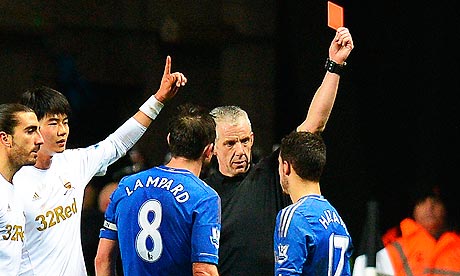It has taken over 100 years but, finally, Swansea City know what it is like to reach a major final. They will play Bradford City at Wembley on 24 February while Chelsea, and Eden Hazard in particular, will reflect on another ignominious chapter in the story of a difficult season.
Chasing a two-goal first-leg deficit, it was remarkable in the first place that Rafael Benítez's side played with such conservatism, not getting a shot on target until the 73rd minute. Yet their prosaic attempts to get back into the match will quickly be forgotten in comparison to what happened in the 78th minute when Hazard went over to get the ball from a ballboy close to the corner flag and ended up being sent off for violent conduct.
The incident was remarkable in many ways, starting with the ballboy seemingly tried to prevent Hazard getting the ball by lying on top of it and playing dead. Hazard tried to wrestle it back and then made the mistake of delivering a short kick to release it. These were extraordinary moments as the youngster then started to roll around in apparent pain, clutching his midriff. What he had been doing shielding the ball, and whether or not he was exaggerating the blow, it was still naive in the extreme from Hazard.
For Chelsea, it was a shabby way to end a demoralising night but the questions do not stop there. How, possibly, could they be so feeble when the prize was so considerable?
They had gone into the night knowing that, unless they could pull off a remarkable feat of escapology, a side that began the season competing for seven trophies would have been left, realistically, with only two. One is the FA Cup, a competition that Chelsea have cherished in the Roman Abramovich era. The other is the Europa League, which they tend to thinks of somewhere between a consolation prize and an afterthought.
More than anything, Benítez will have known that recovering from the damage inflicted at Stamford Bridge, with a final against the 10-placed side in League Two as the prize, may have gone some way to invigorating a difficult season.
Swansea were driven on by very different motives. In 100 years their previous success in knockout competitions amounts to a couple of FA Cup semi-finals and nothing more. Swansea Town, as they were known back then, lost 3-0 to Bolton Wanderers in 1926 and 2-1 to Preston North End 1964. At least Bradford have actually been to a final before and won a major trophy.
For Swansea, it has been a long story of watching from the sidelines, wondering when their time would come. It is difficult to overstate what this opportunity meant to a club with their history.
That perhaps explained why there was an edgy atmosphere for long spells. At first, the Swansea crowd were in full voice but there was a sense of apprehension in those moments when Chelsea had the ball and were pressing forward.
Wayne Routledge and Michu both had the chance to soothe some of the nerves in the early exchanges. Routledge's volley from Jonathan de Guzmán's cross looked goal-bound until César Azpilicueta threw himself into the block and, a couple of minutes later, Petr Cech had to save Michu's left-foot shot.
Yet Chelsea had enough talented players to start pinning back the home side as the first half wore on. The pressure was considerable at times but what Chelsea could not do in that period was concoct a single clear chance. Oscar and Juan Mata were both prominently involved but Swansea's defence formed a stubborn line and the referee Chris Foy was not duped when Demba Ba became the latest player to demonstrate the arts of trying to manufacture a penalty.
Ba had turned beyond Ben Davies before flicking out his right leg to make sure it came into contact with the Swansea left-back. The first contact before then was actually from Davies but what followed was an act of deceit on Ba's part. He pulled it off quite expertly, too. Foy deserves credit for not being taken in even if he should, strictly speaking, have brandished a yellow card.
Ba had been favoured instead of Fernando Torres, who was informed in a 5pm meeting at the team hotel that he would drop out of the side and be among the substitutes. Benítez can hardly be blamed for losing trust in the player who, under his management at Liverpool, once had legitimate credentials to be regarded as the most devastating striker in English football.
All the same, it is a strange and unsatisfactory set of events when a team needs at least two goals but has no room for a £50m striker. Torres can look despondent in these moments sometimes, barely able to conceal his annoyance. Not on this occasion. The Spaniard could be seen laughing and fooling around in the warm-up, running away from his team-mates after messing up a game of keepie-ups.
Ba turned one effort over the crossbar shortly before half time but Chelsea's lack of creativity was a recurring theme. Shortly after the hour, Frank Lampard decided to take matters into his own hands, latching on to Mata's short free-kick and pulling back his right boot. For a player of his accuracy, it was a wild attempt. The first signs of frustration were creeping in.

No comments:
Post a Comment